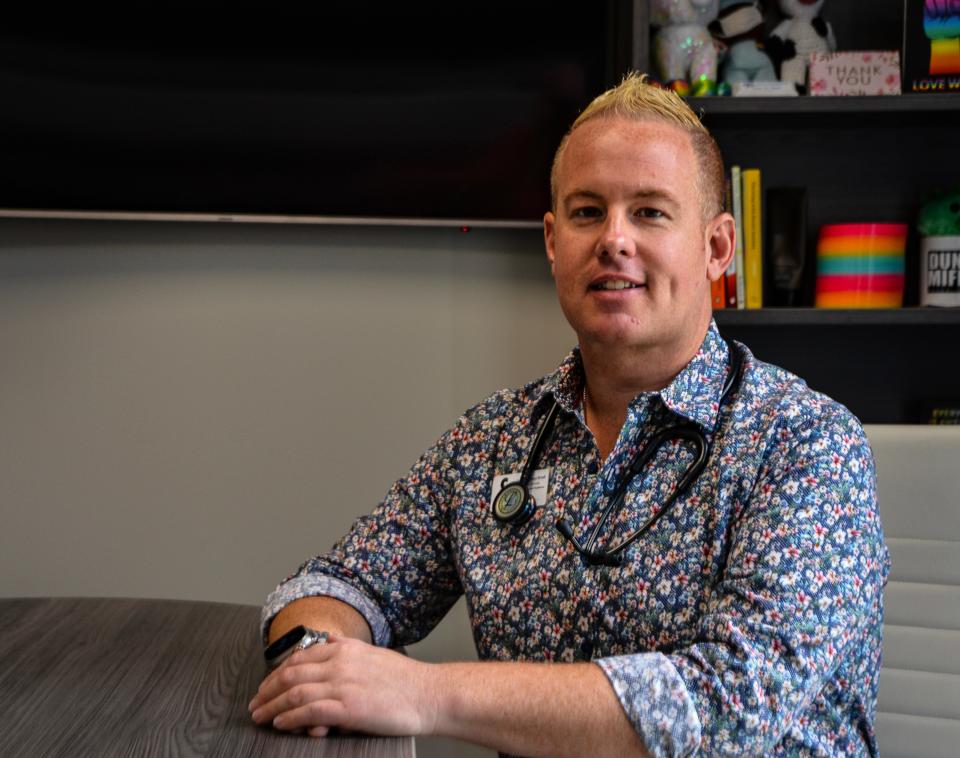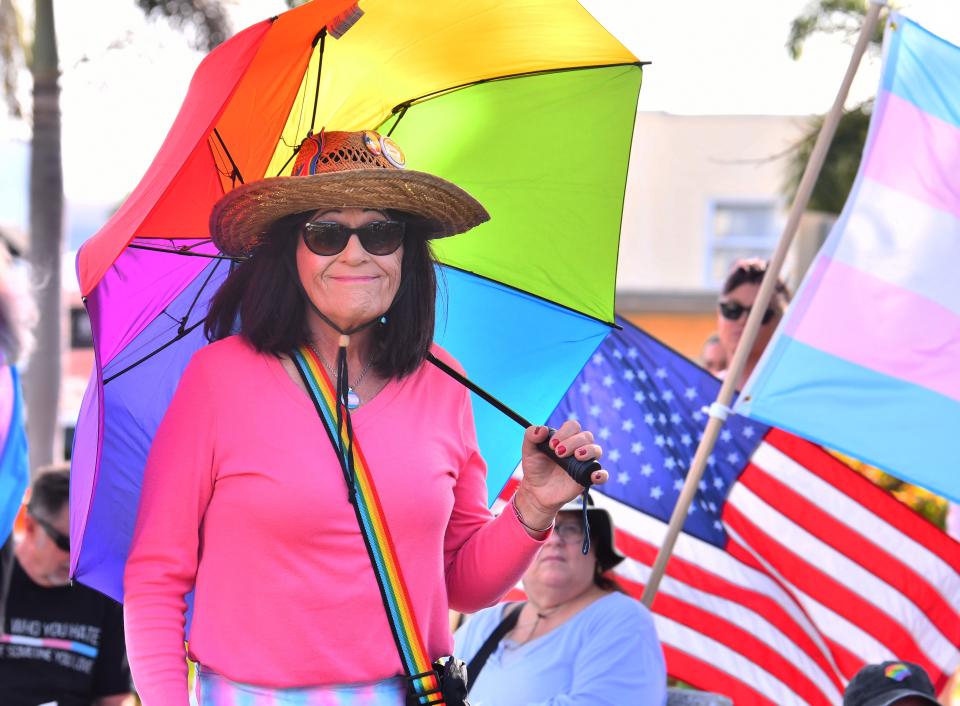Laws affecting health care for the LGBTQ community force change at local SPEKTRUM office
A few years ago, nurse practitioner Joseph Knoll saw a lack of medical and mental health-related resources for LGBTQ people and founded a nonprofit clinic to help fill the gap.
SPEKTRUM Health, which opened in Orlando in 2019, expanded its reach with a clinic that opened in May 2021 in Melbourne. The nonprofit offers, among other services, primary care, mental health treatment and gender-affirming care. They're busy, seeing thousands of patients between the two clinics.
But only two and a half years after its opening, the Melbourne clinic has been forced to temporarily halt in-person medical appointments and lab draws. The change was prompted in part by staffing shortages, with the clinic struggling to find multiple new staff members. They're also facing an adversarial political climate with a new law, Senate Bill 254, that has dramatically changed health care options for Florida's LGBTQ community.

Individual counseling appointments and groups will still be held in person in Melbourne, and Brevard County patients can continue care at the Orlando office in person or via the telehealth platform, said Knoll, who travels between the two clinics.
Still, the decision to alter services at the Melbourne office, even temporarily, is tough, Knoll said.
A search for a third nurse practitioner, to work exclusively in the Melbourne office, has been unsuccessful, Knoll said. Also needed, because of SB 254, signed into law by Gov. Ron DeSantis in May, is a medical doctor or a doctor of osteopathic medicine who can write prescriptions for gender-affirming therapy — something nurse practitioners are no longer allowed to do under the new law. In lieu of a third nurse practitioner, a doctor could take on some of the patient load. SPEKTRUM also seeks a clinical assistant and an administrative coordinator.
"We were seeing patients there one day a week, and just could not keep up with the volume ... we have a large influx of new patients, too," Knoll said.
"And so, until we find a provider, it felt a little unwise to keep seeing new patients, bringing them in knowing we still don't have the infrastructure to be able to support their ongoing care."
More: Permanent rules on transgender health to be made by end of year, Board of Medicine says
In addition to in-person notification, a letter went out to all patients regarding the change, Knoll said. In part, it let them know that the plan is to resume medical care in Melbourne when staffing levels permit. Knoll and Chief Operating Officer Lana Dunn told patients they're working closely with Southern Legal Counsel and other organizations to overturn SB 254. They also said the increased workload and stress of the political climate "take a tremendous toll on all of us at Spektrum, particularly our transgender team members."
"There are people who've just been fantastically supportive, and that's the kind of thing that makes it harder to make this change," said Knoll, who remembers, as a gay man, sensing that providers didn’t seem to understand his health needs.
"It's part of the reason why, for the last several months, I've been doing the best I could to pull that weight. They've just put us in a position where we're having a difficult time finding the staff that we need."
More: Brevard families leaving Florida: Why they say Sunshine State no longer feels like home
Lara Klopp, registered clinical social work intern, will continue seeing clients for counseling sessions.
The change in the delivery of medical services "is highly unfortunate for the LGBTQ+ population of Brevard," she said.
"Time and again I've seen SPEKTRUM be a haven for members of the LGBTQ+ community, especially transgender and nonbinary patients/clients," Klopp said.
"So many trans and nonbinary patients have told me about the medical trauma they have experienced in non-affirming clinics — going in to see their care provider for a routine visit or procedure, they often find themselves the subject of discrimination and scrutiny because of their gender identity or sexual orientation."
The political fallout
The new law's restrictions on health care for transgender Floridians have been controversial from its inception.
Parents of three transgender minors filed a lawsuit, and were later joined by adult plaintiffs, who say that the law and further action from the state Board of Medicine and Board of Osteopathic Medicine have created a "crisis of availability of care" for transgender people.
More: Hateful rhetoric, new laws rob me of my security and safety | Opinion
Initially, SB 254 codified a complete gender-affirming care ban from the Board of Medicine for minors into law and dramatically restricted care for adults, barring them from using nurse practitioners or telehealth for prescriptions and forcing them to make in-person visits with a doctor. While U.S. District Judge Robert Hinkle in June blocked enforcement of the ban for minors, allowing them to continue to receive care, he has stated that adult plaintiffs have not proved they would suffer irreparable damage immediately from the ruling.
The legislation, and resulting actions, have definitely had an impact on finding potential staff members, Knoll said.
"The hard part is with so many people moving out of Florida, our labor pool has shrunk," he said. "Especially within the LGBTQ community, if they didn't have a job, a lot of them left the state ... we have not been able to have a big pool of candidates. And the candidates we have had, once they find out about the political climate, and our specialty within the LGBTQ community, they're afraid to work in the field."
Klopp said when clients first come to SPEKTRUM, they "almost universally describe a feeling of peace and relief."
"Receiving medical and mental health care which can fully focus on their medical and mental health rather than being infused with the bigotry and bias of others is an immediate lifting of weight," she said.
"Patients/clients who have avoided medical and mental health care due to that trauma finally find a place where they can go to have their needs met."

The issue is complex and frustrating, Knoll said. He's shocked by the way politicians speak about parents and families in the LGBTQ community. He's been called names. Attacked for his specialty.
The "louder the bigots are," he said, "just proves that more people are needed to work in this field."
"I hear absolutely heartbreaking stories every day from my patients," said Knoll. "There's this idea that the public has that every trans person is running around with a pink and blue flag, announcing themselves as trans ... that's very false.
"There are thousands of members of our community, our workforce, our teams, in different aspects of life, who are trans. What has happened with all this absurd amount of legislation is that people have been emboldened to say and do and act very inappropriately. People are making it a political issue to take health care to a marginalized community, and villainizing people for accessing health care."
Knoll remains confident that the Melbourne office will find the staffing it needs, and wants to dispel any notion that the clinic is closing.
And SPEKTRUM remains dedicated to serving patients, he said.
"Our top priority is to resolve this matter ... we're not going to be bullied," he said.
"I'm not going to stop doing what I'm doing. I've spent years getting to know the trans community and understanding their needs and their goals. I'm not going to be bullied out of caring for individuals who genuinely need care. It is our full intention to, as soon as possible, get Melbourne back up and running, full steam ahead."
Britt Kennerly is education/breaking news editor at FLORIDA TODAY. Contact Kennerly at 321-917-4744 or bkennerly@floridatoday.com. Twitter: @bybrittkennerly Facebook: /bybrittkennerly.
This article originally appeared on Florida Today: New laws prompt changes for now at clinic serving LGBTQ patients

